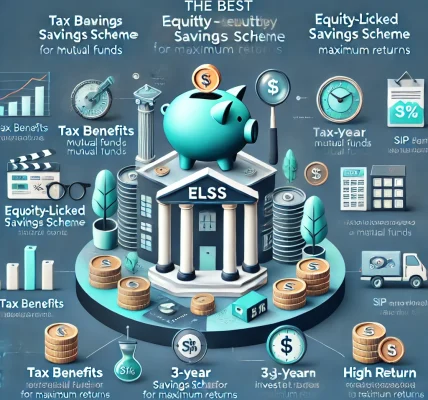Introduction
Investing in mutual funds is a popular way to build wealth, but choosing between equity and debt mutual funds can be challenging. The right choice depends on your risk tolerance, investment horizon, and financial goals. While equity mutual funds offer the potential for high returns with market volatility, debt mutual funds provide stability with lower risk.
In this guide, we’ll compare equity and debt mutual funds, helping you determine which option best suits your risk appetite.
1. Understanding Equity Mutual Funds
What Are Equity Mutual Funds?
Equity mutual funds invest primarily in stocks, aiming for long-term capital appreciation. These funds are best suited for investors with a high-risk tolerance and a long investment horizon.
Types of Equity Mutual Funds
- Large-Cap Funds – Invest in well-established, financially stable companies.
- Mid-Cap Funds – Target mid-sized companies with growth potential but higher volatility.
- Small-Cap Funds – Focus on emerging companies with high growth potential but significant risk.
- Sectoral/Thematic Funds – Invest in specific industries like technology, healthcare, or finance.
- Index Funds – Passively track stock market indices like NIFTY 50 or SENSEX.
Pros of Equity Mutual Funds
✅ Potential for high returns in the long run. ✅ Good hedge against inflation. ✅ Ideal for wealth creation over 5-10+ years.
Cons of Equity Mutual Funds
❌ High market risk and volatility. ❌ Requires patience and a long-term approach.
2. Understanding Debt Mutual Funds
What Are Debt Mutual Funds?
Debt mutual funds invest in fixed-income securities like government bonds, corporate bonds, and treasury bills. They are suitable for conservative investors looking for stable returns with lower risk.
Types of Debt Mutual Funds
- Liquid Funds – Short-term funds with high liquidity, ideal for emergency funds.
- Short-Term Debt Funds – Invest in bonds with 1-3 years of maturity.
- Gilt Funds – Invest in government securities, ensuring minimal credit risk.
- Corporate Bond Funds – Offer higher returns by investing in high-rated corporate debt.
- Dynamic Bond Funds – Adjust portfolio based on interest rate movements.
Pros of Debt Mutual Funds
✅ Lower risk compared to equity funds. ✅ More stable returns with lower volatility. ✅ Suitable for short- to medium-term financial goals.
Cons of Debt Mutual Funds
❌ Lower returns compared to equity funds. ❌ Interest rate fluctuations can impact performance.
3. Equity vs. Debt Mutual Funds: A Side-by-Side Comparison
| Feature | Equity Mutual Funds | Debt Mutual Funds |
|---|---|---|
| Risk Level | High | Low to Moderate |
| Returns | Potentially high (10-15% CAGR) | Moderate (5-8% CAGR) |
| Investment Horizon | Long-term (5+ years) | Short to medium-term (1-5 years) |
| Volatility | High | Low |
| Best For | Aggressive investors, long-term wealth creation | Conservative investors, stable returns |
4. How to Choose Based on Your Risk Appetite
For Aggressive Investors (High Risk Tolerance)
- Prefer equity mutual funds for long-term growth.
- Diversify across large-cap, mid-cap, and small-cap funds.
- Be prepared for market fluctuations and invest for at least 5-10 years.
For Conservative Investors (Low Risk Tolerance)
- Choose debt mutual funds for stability and predictable returns.
- Invest in liquid, gilt, or corporate bond funds for lower volatility.
- Suitable for short-term goals like emergency funds or capital preservation.
For Balanced Investors (Moderate Risk Tolerance)
- Opt for a mix of equity and debt mutual funds.
- Consider hybrid funds that balance equity and debt exposure.
- Adjust your portfolio allocation based on market conditions and personal financial goals.
5. Tax Implications of Equity and Debt Mutual Funds
Equity Mutual Funds
- Short-Term Capital Gains (STCG): 15% if sold within one year.
- Long-Term Capital Gains (LTCG): 10% for gains exceeding ₹1 lakh per financial year.
Debt Mutual Funds
- Taxed based on the investor’s income tax slab (as per new taxation rules).
- Consider tax-efficient withdrawal strategies to optimize post-tax returns.
6. Key Takeaways: Making the Right Choice
✅ If you are a risk-taker with long-term financial goals → Choose Equity Mutual Funds. ✅ If you seek stability and lower risk → Choose Debt Mutual Funds. ✅ If you want a mix of growth and stability → Consider Hybrid Funds.
By understanding your risk tolerance and financial goals, you can make an informed investment decision that aligns with your needs.
Disclaimer: This article is for informational purposes only and should not be considered financial advice. Please consult a certified financial advisor before making investment decisions.




